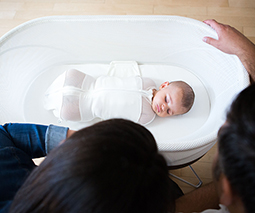Be kind, rewind: What the four month sleep regression is really about

So you made it through the fourth trimester and you’re finally starting to feel normal. You’ve found your parenting feet and have got to know your baby’s behaviour pretty well.
Even better than that, you’re finally getting some decent sleep.
Your baby still wakes in the night, but is getting better chunks of sleep in, which means you are too. You actually feel like a human being, instead of that sleepless zombie you felt like a few weeks back.
But then something changed, and everything fell apart.
Now your baby is hitting four months old, suddenly he’s back to waking several times overnight and is even fighting day sleeps. When he does take a nap, he’s waking after 45 minutes.
Everything was working so well before – what could possibly be happening?
What’s a sleep regression?
As your baby’s sleep matures, he’ll naturally go through several sleep regressions, a term used to describe baby’s periods of disrupted sleep – just when you thought things were getting on track.
These happen at several points in your baby’s first couple of years, and typically coincide with a developmental leap.
So before you blame yourself for creating poor sleep habits and start researching sleep consultants, stop for a minute and consider what your baby is going through at this point in his life.
Why it’s hard for your baby
When your baby reaches four months of age, his little world turns upside down. Compared to those sleepy first three months, this age is where a whole heap of learning and new awareness occurs, causing a frenzy of connections in that clever little brain of his.
In just a few short weeks, your baby has become much stronger and able to do more things, which means his perception of his world has changed immeasurably.
For many babies, this can cause their behaviour to be more unsettled and clingy – and this extends to their overnight sleeping behaviour.
What this amounts to is that your developing baby may start waking in the night more often and needing you more to help him get through this busy stage. All that learning can be hard to switch off from, particularly if you’re just a little person! In fact, some experts prefer to think of sleep regression as a progression, because of the developmental leaps forward that are happening below the surface.
In other words, when your baby is going through a sleep regression or blip like this (and they can last anywhere between two to six weeks), he needs your comfort and reassurance to help him gradually slip back into his sleeping routine.

Why it’s hard for you
It’s tough work being mum to a four or five month old baby going through this sleeping blip, just when you were finally getting things sorted. It doesn’t help that, with an older baby now, your support network has probably dropped out a little bit at this point.
Your visitors have stopped asking if you need help, the midwife no longer checks in on you and you’re pretty much left on your own to figure this whole thing out.
It’s no fun being sleep deprived, and if your baby is fussing about day sleeps as well, you’re virtually getting no rest at this point, and likely to be dealing with an overtired, unsettled baby as well.
How to get through it
So how do you deal with a baby who wakes repeatedly overnight and is building a big sleep debt – that only makes falling to sleep that much harder?
Here are some tips for getting through the four month sleep regression:
- Remember that this is normal baby behaviour – and nothing to do with your parenting.
- Seek out support – use the drop-in service at your early childhood centre to ask for extra guidance on getting through this period if you’re finding it hard. Similarly, you can call a parenting helpline to vent a little and get some clarity.
- Help your baby get to sleep to ward off accumulating a big sleep dept, which is only going to make things worse. You can do this by taking your baby for a walk in the pram if this helps him sleep, or try using a baby carrier.
- Bring bedtime forward – if your baby isn’t sleeping well during the day, try moving bedtime to an earlier one so he can catch up on sleep a little – and give you a break too.
- Work on a bedtime routine – this is a good time to hone your bedtime ritual and keep it as sleep-friendly as possible. Make the room nice and dark and use some positive sleep associations to help convince your little person that sleep time is nigh.
I know you’ve heard this one before, but you’ll get through this. Your baby will eventually move through this period and towards the next developmental leap, which will bring about a whole new unsettled period. But let’s not think about that today, right?!
 Need some more baby sleep advice? Our Parent School sleep experts can help. Click to find out more or book a one-on-one session.
Need some more baby sleep advice? Our Parent School sleep experts can help. Click to find out more or book a one-on-one session.













